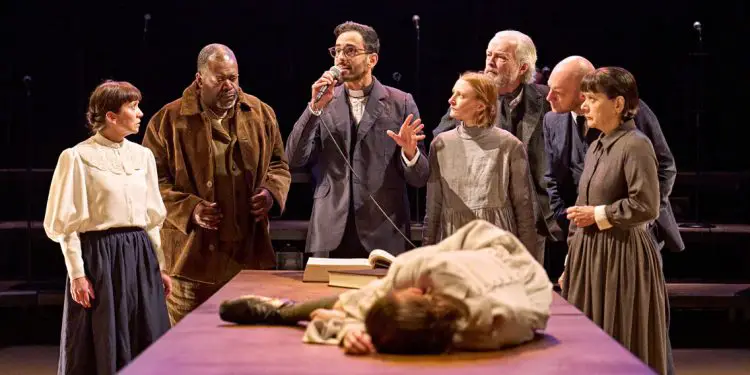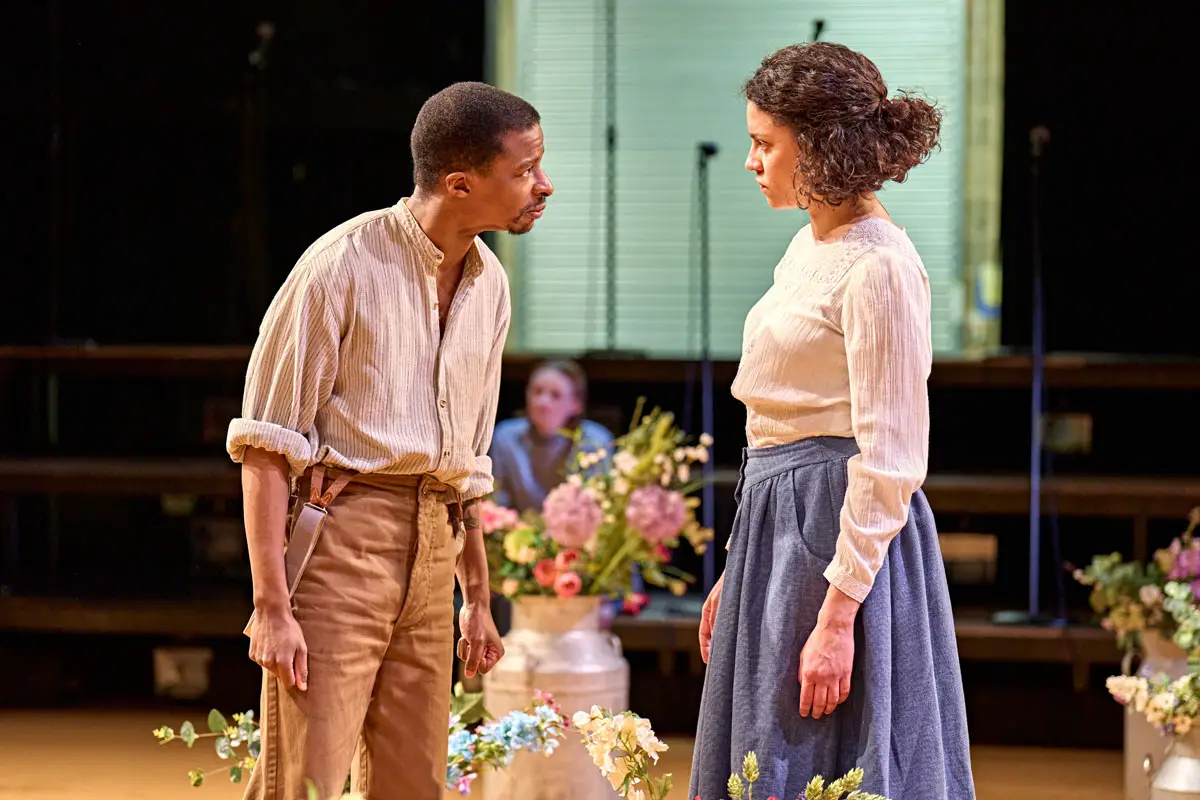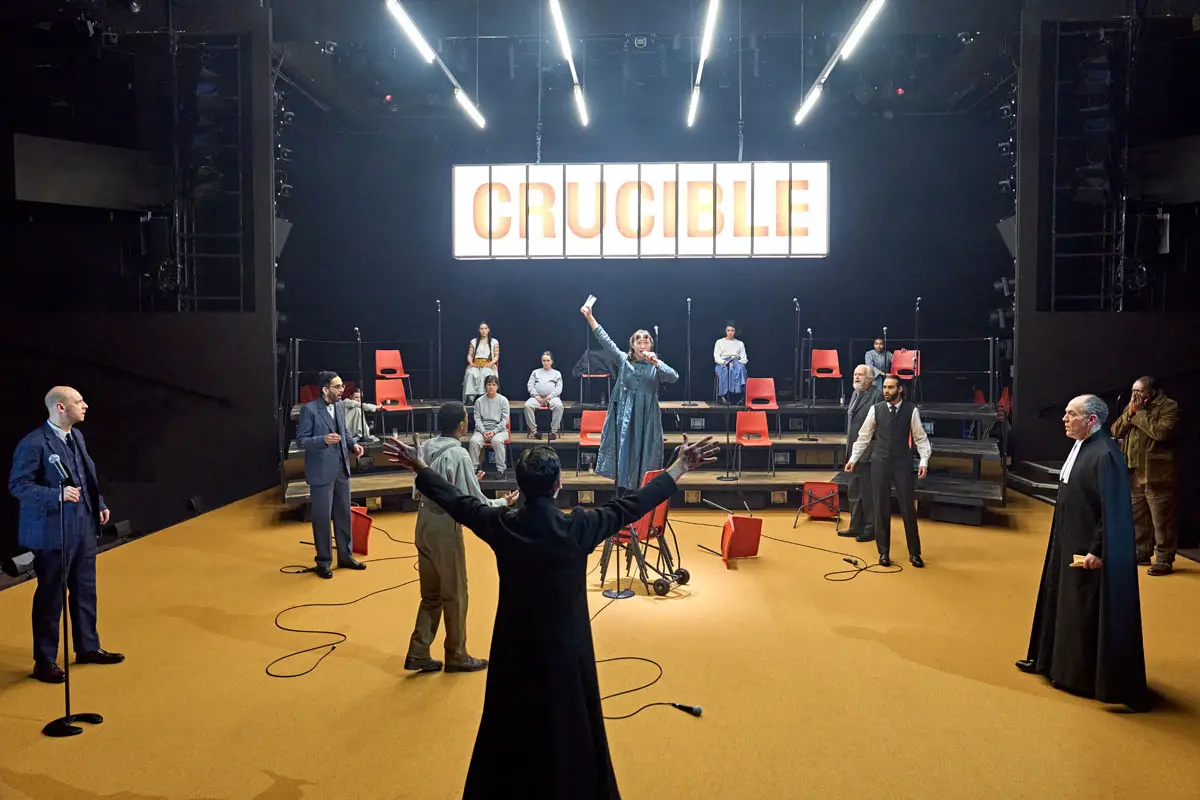The Crucible – Review – Sheffield Crucible Theatre

By Clare Jenkins, March 2024
Seven years before Arthur Miller wrote The Crucible in protest against the 1950s anti-Communist witch hunt in America, German Lutheran preacher Pastor Martin Niemöller penned his poem ‘First They Came’.
Starting ‘First they came for the Communists/And I did not speak out/Because I was not a Communist…’ it goes through socialists, trade unionists and Jews before ending ‘Then they came for me/And there was no one left/To speak out for me’.
Niemöller got his message across in under a hundred words. Miller takes three hours. Three long hours telling a slow-burn story of ‘witchcraft’ that shows how the tiny spark of a rumour can gradually grow into a forest fire engulfing a whole community and taking the lives of innocent people.
Based on the 17th Century Salem witch trials in Massachusetts, The Crucible starts with a gang of girls having been caught dancing and engaged in a pagan ritual in the woods the previous night. Accused of being in league with the devil, they respond by accusing their female neighbours and employers of the same satanic pact.
“Intense”
The powerful men in the community take up their vengeful cause: “It’s God’s work we do,” says the Rev Pariss (Sargon Yelda), as he journeys from voice of reason to a belief in harsh justice. Gradually, the ever-expanding lies and deceit destroy the God-fearing community, with wives and mothers hanged, children and cattle left to starve, crops to fail.
Many in Thursday’s audience obviously found the production, directed by Anthony Lau, intense and engrossing, with its underlying hum of menacing music. Others might have wondered why they were watching what appeared to be an extended dress rehearsal. That impression was enhanced by Georgia Lowe’s set: a largely empty room, furnished with just a few stacking chairs, two ping-pong tables and three rows of tiered seating at the back.
Within two years, Lau has gone from the excess of Anna Karenina (roller-skates, psychedelic costumes, disco balls…) to pared-down Puritanical. The costumes are grey and black, the only colour supplied by the flowers in the milk churns brought on to indicate farmer John Proctor’s fields. (Question: why does everyone drink milk? Is it supposed to represent the milk of human kindness draining away?).
“Moral message”
The result is part evangelical revival meeting (with communal gospel-singing and microphones for the actors to grab every so often), part courtroom. At that point, the main theatre lights come on and the audience are directly addressed (in a variety of accents), almost as though we’re the jurors, being asked to explore our own consciences lest we, too, become accusers.
It’s an ever-relevant moral message, here delivered with fluency but without much in the way of actual action. That’s obviously the way Miller wrote it, with trials and executions happening off-stage. But here it’s accentuated by the direction, setting and, despite the scenes of communal hysteria, a lack of much dramatic tension or, indeed, much sense of individual personality or expression.
Simon Manyonda’s Proctor (“a good man only somewhat bewildered”) is one of the more convincing performances as the father who, to his fatal discredit, seduces his household servant Abigail while his wife Elizabeth (a quietly dignified Anoushka Lucas) is recovering from the birth of their third son.
“Skewed belief system”
As his actions provide the seed for what follows, he comes to realise that “the world has gone dark in this nonsense”. Or, as Mary (Millicent Wong), one of the other “crazy little children”, cries at one point, “It were only sport in the beginning, sir. But then the whole world cried spirits, spirits…”
Rose Shalloo is an aloof, impassive Abigail, making it difficult to see her as a figure of either lust or evil. Alexandra Mathie is steadfast as Rebecca Nurse, trying to get her neighbours to see sense. And, as the two ministers, Yelda and Sid Sagar (playing Reverend Hale, belatedly seeing the error of his ways) show how a skewed belief system can have long-lasting negative consequences.
Ultimately, though, I was left wondering whether the production was absorbing or self-absorbed. Let the court decide.
‘The Crucible’ is at Sheffield’s Crucible Theatre until 30th March












